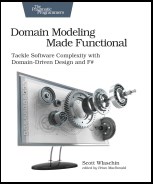Out-of-the-box behavior for types
One nice thing about F# is that most types immediately have some useful “out-of-the-box” behavior such as immutability and built-in equality, functionality that often has to be explicitly coded for in C#.
By “most” F# types, I mean the core “structural” types such as tuples, records, unions, options, lists, etc. Classes and some other types have been added to help with .NET integration, but lose some of the power of the structural types.
This built-in functionality for these core types includes:
- Immutability
- Pretty printing when debugging
- Equality
- Comparisons
Each of these is addressed below.
In C# and Java, it is has become good practice to create immutable classes whenever possible. In F#, you get this for free.
Here is an immutable type in F#:
type PersonalName = {FirstName:string; LastName:string}
And here is how the same type is typically coded in C#:
class ImmutablePersonalName
{
public ImmutablePersonalName(string firstName, string lastName)
{
this.FirstName = firstName;
this.LastName = lastName;
}
public string FirstName { get; private set; }
public string LastName { get; private set; }
}
That’s 10 lines to do the same thing as 1 line of F#.
In F#, you don’t have to override ToString() for most types – you get pretty printing for free!
You have probably already seen this when running the earlier examples. Here is another simple example:
type USAddress =
{Street:string; City:string; State:string; Zip:string}
type UKAddress =
{Street:string; Town:string; PostCode:string}
type Address =
| US of USAddress
| UK of UKAddress
type Person =
{Name:string; Address:Address}
let alice = {
Name="Alice";
Address=US {Street="123 Main";City="LA";State="CA";Zip="91201"}}
let bob = {
Name="Bob";
Address=UK {Street="221b Baker St";Town="London";PostCode="NW1 6XE"}}
printfn "Alice is %A" alice
printfn "Bob is %A" bob
The output is:
Alice is {Name = "Alice";
Address = US {Street = "123 Main";
City = "LA";
State = "CA";
Zip = "91201" };}
Bob is {Name = "Bob";
Address = UK {Street = "221b Baker St";
Town = "London";
PostCode = "NW1 6XE";};}
In C#, you often have to implement the IEquatable interface so that you can test for equality between objects. This is needed when using objects for Dictionary keys, for example.
In F#, you get this for free with most F# types. For example, using the PersonalName type from above, we can compare two names straight away.
type PersonalName = {FirstName:string; LastName:string}
let alice1 = {FirstName="Alice"; LastName="Adams"}
let alice2 = {FirstName="Alice"; LastName="Adams"}
let bob1 = {FirstName="Bob"; LastName="Bishop"}
//test
printfn "alice1=alice2 is %A" (alice1=alice2)
printfn "alice1=bob1 is %A" (alice1=bob1)
In C#, you often have to implement the IComparable interface so that you can sort objects.
Again, in F#, you get this for free with most F# types. For example, here is a simple definition of a deck of cards.
type Suit = Club | Diamond | Spade | Heart
type Rank = Two | Three | Four | Five | Six | Seven | Eight
| Nine | Ten | Jack | Queen | King | Ace
We can write a function to test the comparison logic:
let compareCard card1 card2 =
if card1 < card2
then printfn "%A is greater than %A" card2 card1
else printfn "%A is greater than %A" card1 card2
And let’s see how it works:
let aceHearts = Heart, Ace
let twoHearts = Heart, Two
let aceSpades = Spade, Ace
compareCard aceHearts twoHearts
compareCard twoHearts aceSpades
Note that the Ace of Hearts is automatically greater than the Two of Hearts, because the “Ace” rank value comes after the “Two” rank value.
But also note that the Two of Hearts is automatically greater than the Ace of Spades, because the Suit part is compared first, and the “Heart” suit value comes after the “Spade” value.
Here’s an example of a hand of cards:
let hand = [ Club,Ace; Heart,Three; Heart,Ace;
Spade,Jack; Diamond,Two; Diamond,Ace ]
//instant sorting!
List.sort hand |> printfn "sorted hand is (low to high) %A"
And as a side benefit, you get min and max for free too!
List.max hand |> printfn "high card is %A"
List.min hand |> printfn "low card is %A"

 Twitter
Twitter